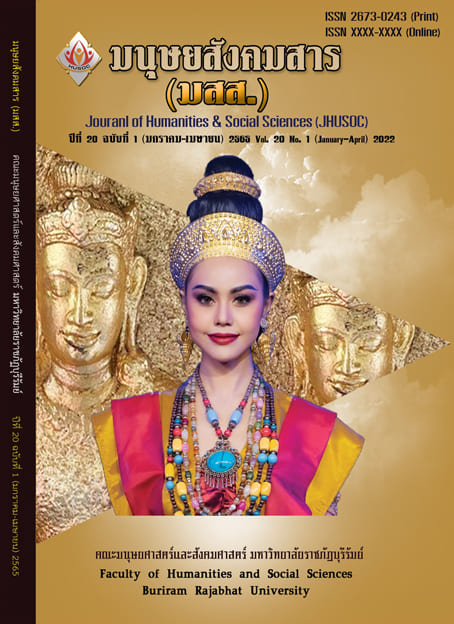ความสัมพันธ์ของประสบการณ์ในการออกแบบการเรียนรู้และความสามารถในการสะท้อนคิดของนิสิตครู
Main Article Content
บทคัดย่อ
การสะท้อนคิดถือเป็นการประเมินในฐานะกลไกของการเรียนรู้ที่นำไปสู่ การพัฒนาตนเอง ทั้งนี้พบว่าคนที่มีคุณภาพการสะท้อนคิดดีมักเป็นผู้ที่มีประสบการณ์ในเรื่องนั้น ๆ การศึกษาครั้งนี้จึงสนใจศึกษาความสัมพันธ์และอิทธิพลของประสบการณ์ในการออกแบบการเรียนรู้และการสะท้อนคิดของนิสิตครู โดยการศึกษาครั้งนี้ใช้ การสะท้อนคิดแบบร่วมมือร่วมใจ ประกอบด้วยการสะท้อนคิดตนเอง และการให้ข้อมูลย้อนกลับ ของนิสิตครูหลักสูตรการศึกษาบัณฑิต สาขาวิชาวิทยาศาสตร์ทั่วไป จำนวน 112 คน ซึ่งได้จากการสุ่มแบบกลุ่ม เก็บข้อมูลจากแบบบันทึกการสะท้อนคิดและแบบสัมภาษณ์แบบกึ่งโครงสร้าง การวิเคราะห์ข้อมูลโดยใช้สหสัมพันธ์ของเพียร์สันและการวิเคราะห์การถดถอยเชิงเส้นอย่างง่าย ผลการศึกษาพบว่า การสะท้อนคิดตนเองของนิสิตครูกับประสบการณ์ในการออกแบบการเรียนรู้มีความสัมพันธ์กันในระดับค่อนข้างต่ำ เมื่อศึกษาค่าอิทธิพลพบว่าตัวแปรประสบการณ์ในการออกแบบการเรียนรู้สามารถอธิบายการสะท้อนคิดตนเองได้ ร้อยละ 2.70 ในขณะที่การการให้ข้อมูลย้อนกลับไม่มีความสัมพันธ์กับประสบการณ์ในการออกแบบการเรียนรู้
Article Details

อนุญาตภายใต้เงื่อนไข Creative Commons Attribution-NonCommercial 4.0 International License.
เนื้อหาและข้อมูลในบทความที่ลงตีพิมพ์ในวารสารทดสอบระบบ ThaiJo2 ถือเป็นข้อคิดเห็นและความรับผิดชอบของผู้เขียนบทความโดยตรงซึ่งกองบรรณาธิการวารสาร ไม่จำเป็นต้องเห็นด้วย หรือร่วมรับผิดชอบใดๆ
บทความ ข้อมูล เนื้อหา รูปภาพ ฯลฯ ที่ได้รับการตีพิมพ์ในวารสารทดสอบระบบ ThaiJo2 ถือเป็นลิขสิทธิ์ของวารสารทดสอบระบบ ThaiJo2 หากบุคคลหรือหน่วยงานใดต้องการนำทั้งหมดหรือส่วนหนึ่งส่วนใดไปเผยแพร่ต่อหรือเพื่อกระทำการใดๆ จะต้องได้รับอนุญาตเป็นลายลักอักษรจากวารสารทดสอบระบบ ThaiJo2 ก่อนเท่านั้น
เอกสารอ้างอิง
Cojorn, K. (2022). A study of preservice teachers’ reflective thinking through lesson study guideline. Journal of Education Prince of Songkla University, 33(3). [in Thai]
Dann, R. (2002). Promoting assessment as learning: Improving the learning process. London: Routledge/Falmer.
Dewey, J. (1938). Experience and education. New York: Macmillan.
Farrell, T. S. C. (2004). Reflective practice in action. Corwin Press.
Fatih, D. (2015). The effect of reflective thinking on the teaching practices of preservice physical education teachers. Educational Research, 25(3), 260-275.
Finlay, L. (2008). Reflecting on reflective practice. PBPL.
Furlong, J. & Maynard, T. (1995). Mentoring student teacher: The growth of professional knowledge. London: Routledge.
Geddis, N. (1993). Transforming subject-matter knowledge: The role of pedagogical content knowledge in learning to reflect on teaching. International Journal of Science Education, 15(6), 673-683.
Ghaye, T. (2010). Teaching and learning through reflective practice: A practical guide for positive action. London: Routledge.
Hord, S. M., Roussin, J. L., & Sommers, W. A. (2009). Guiding professional learning communities: Inspiration, challenge, surprise, and meaning. Thousand Oaks, CA: Corwin.
Ineke, F., Ton, V., Laurinda, L., & Ingvar, T. (1999). Preservice physics teachers and conceptual difficulties on temperature and heat. European Journal of Teacher Education, 22(1), 61-74.
Kagan, D.M. (1992). Professional growth among preservice and beginning teachers. Review of Educational Research, 62(2), 129-169.
Kember, D., Mckey, J., Sinclair, K., & Frances, K. (2008). A four category scheme for coding and assessing the level of reflection in written work. Assessment & Evaluation in Higher Education, 33(4), 369-379.
Kolb, D.A. (1984). Experiential learning: Experience as the source of learning and development. Englewood Cliffs, NJ: Prentice Hall.
Mok, Y. F. (2005). A philosophy of teaching practicum: construction of a personal theory of teaching and learning. Teacher Development, 9(1), 43-57.
Naghdipour, B., & Emeagwali, O. (2013). Assessing the level of reflective thinking in ELT students. Procedia-Social and Behavioral Sciences, 83(2013), 266 -271.
Ono, Y., Chikamori, K., & Rogan, J.M. (2013). How reflective are lesson study discussion sessions? Developing an instrument to analyze collective reflection. International Journal of Education, 5(3), 52-67.
Pimpa, P. (2018). Current Thai studies. Academic Journal of Mahamakut Buddhist University Roi Et Campus, 7(1), 242-249. [in Thai]
Western and Northern Canadian Protocol for Collaboration in Education. (2006). Rethinking classroom assessment with purpose in mind. Manitoba Education, Citizenship and Youth.
Salkind, N. j. (2014). Exploring research (8th ed). Pearson Education, Harlow, Essex.
Sardareh, S. A., & Saad, M. R. M. (2012). A sociocultural perspective on assessment for learning: The case of a Malaysian primary school ESL context. Procedia - Social and Behavioral Sciences, 66(Supplement C), 343-353.
Schön, D. (1987). Educating the reflective practitioner. Jossey Bass.
Schwarz, B., Dreyfus, T., & Hershkowits, N. H. R. (2004). Teacher guidance of knowledge construction. Proceedings of the 28th Conference of the International Group for the Psychology of Mathematics Education. 4, 169-176. http://www.kurims.kyotou.ac.jp/ EMIS/proceedings/ PME28/RR/RR175_Schwarz.pdf
Tawanwongsri, W., & Phenwan, T. (2018, 26-27, March). Effectiveness of reflection in medical students. The 6th Active Learning National Conference. Walailak University. [in Thai]
Yaffe, E. (2010). The reflective beginner: Using theory and practice to facilitate reflection among newly qualified teachers. Reflective Practice, 11(3), 381-391.
Yong, J., & Chuchu, Z. (2021). New methods to support effective collaborative refection among kindergarten teachers: An action research approach. Early Childhood Education Journal, 49(1), 247–258.


